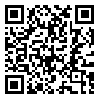Volume 3, Issue 1 (5-2020)
2020, 3(1): 0-0 |
Back to browse issues page
Download citation:
BibTeX | RIS | EndNote | Medlars | ProCite | Reference Manager | RefWorks
Send citation to:



BibTeX | RIS | EndNote | Medlars | ProCite | Reference Manager | RefWorks
Send citation to:
Shohani M, Mousavimoghadam S R. Psychometry (Validation and Reliability) of Professional Attitude for Student Nurses scale (IPASN). Journal title 2020; 3 (1)
URL: http://newresearch.medilam.ac.ir/article-1-1064-en.html
URL: http://newresearch.medilam.ac.ir/article-1-1064-en.html
Department of Nursing, School of Nursing and Midwifery, Ilam University of Medical sciences, Ilam, Iran
Abstract: (2622 Views)
Introduction: Professionalism is one of the basic concepts in nursing and is the result of the individual's interaction with the work environment and others. Nursing professionalism affects the quality of care and is influenced by several factors. This study was conducted to determine the attitude of nurses towards professionalism and the factors affecting it.
Methods: In the present descriptive study, nurses 'attitudes toward professionalism were measured using the Hall questionnaire, and students' attitudes were measured using the IPASN questionnaire. 140 nurses working in educational and medical centers under the supervision of the University of Medical Sciences and 120 undergraduate nursing students studying in the study using stratified random sampling participated in the study. Data were analyzed using SPSS software and descriptive and inferential statistics.
Results: The results showed that the professional attitude of nurses and nursing students is at a moderate level. Among the five dimensions, the highest scores were in the dimensions of "belief in public services" and "sense of acceptance of the field" and the lowest scores were related to the dimensions of "belief in self-regulation" and "sense of independence". The relationship between attitudes toward professionalism and service experience variables and participation in training courses for individual empowerment was statistically significant (P <0.05). In students, the highest scores were in the dimensions of participation and cooperation and there is a significant relationship between the total score of attitude and gender and semester (P <0.05).
Discussion and Conclusion: The attitude of nurses and nursing students towards professionalism is moderate. Given the importance of professionalism in nurses and its impact on many factors, efforts should be made to reach the desired level and reduce barriers.
Methods: In the present descriptive study, nurses 'attitudes toward professionalism were measured using the Hall questionnaire, and students' attitudes were measured using the IPASN questionnaire. 140 nurses working in educational and medical centers under the supervision of the University of Medical Sciences and 120 undergraduate nursing students studying in the study using stratified random sampling participated in the study. Data were analyzed using SPSS software and descriptive and inferential statistics.
Results: The results showed that the professional attitude of nurses and nursing students is at a moderate level. Among the five dimensions, the highest scores were in the dimensions of "belief in public services" and "sense of acceptance of the field" and the lowest scores were related to the dimensions of "belief in self-regulation" and "sense of independence". The relationship between attitudes toward professionalism and service experience variables and participation in training courses for individual empowerment was statistically significant (P <0.05). In students, the highest scores were in the dimensions of participation and cooperation and there is a significant relationship between the total score of attitude and gender and semester (P <0.05).
Discussion and Conclusion: The attitude of nurses and nursing students towards professionalism is moderate. Given the importance of professionalism in nurses and its impact on many factors, efforts should be made to reach the desired level and reduce barriers.
: Cross sectional |
Subject:
General
Received: 2015/03/30 | Accepted: 2016/04/11 | Published: 2020/06/15
Received: 2015/03/30 | Accepted: 2016/04/11 | Published: 2020/06/15
Send email to the proposal executer
| Rights and permissions | |
 | This work is licensed under a Creative Commons Attribution-NonCommercial 4.0 International License. |






